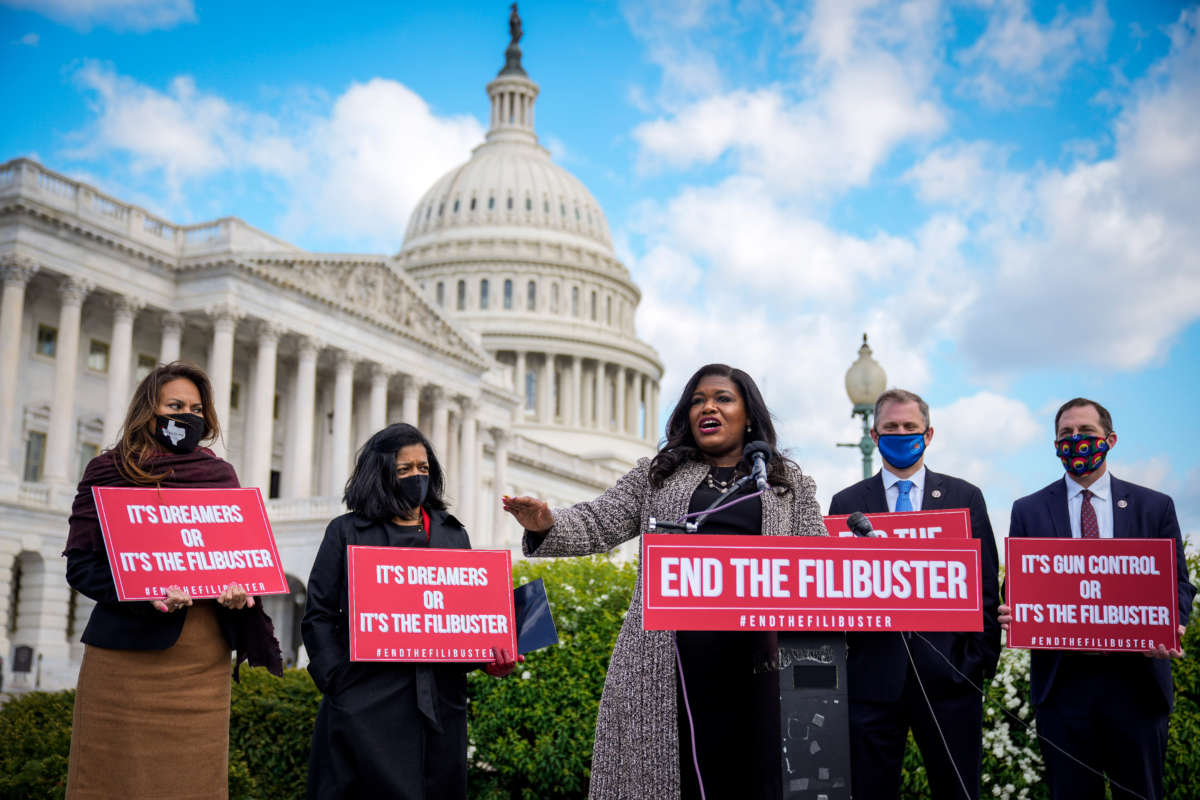Truthout is an indispensable resource for activists, movement leaders and workers everywhere. Please make this work possible with a quick donation.
Representatives Cori Bush (D-Missouri) and Pramila Jayapal (D-Washington) are leading an effort with nearly 100 of their fellow House members to end the Senate filibuster. The lawmakers join many progressive and Democratic advocates in saying that the filibuster is a roadblock to progress.
“In today’s hyper-partisan climate, there is simply no avenue for bold legislation that meets the needs of everyday Americans without ending the filibuster,” the representatives wrote in a letter to Senate Majority Leader Chuck Schumer (D-New York). “We must end the gridlock that has become common practice in Washington and govern boldly and transformatively to improve the lives of millions of people, children, and families all across the country.”
The lawmakers say that getting rid of the filibuster, which forces bills to have 60 votes to be able to pass, is essential to passing things like a $15 federal minimum wage, voting rights bills like the For the People Act, climate bills, and reforms on immigration and gun rights, among other proposals.
“For too many people in our communities, their very survival is at stake. Republicans are well aware that removing barriers to passing legislation will have a transformational impact on these communities,” the lawmakers write. “It is why they are passing legislation at the state level across the country in an attempt to suppress the votes of Black, brown and Indigenous people. It is also why they are preventing the Senate from advancing critical legislation that can meet the needs of the people we represent.”
The letter notes that lawmakers from both sides of the aisle have tried to get rid of the filibuster before. In fact, lawmakers got rid of the House’s filibuster 130 years ago because it was preventing progress.
The Senate filibuster, as the lawmakers point out, is a relic of the Jim Crow era and has a history of being used to block civil rights. Advocates have said that filibuster abolition is thus an issue of racial equality and justice.
“Filibuster reform is critical for advancing racial justice,” said Senior Director of Democracy and Criminal Justice for Color of Change Scott Roberts in a statement. “Democratic Senators who defend the filibuster are protecting a legacy of racism, and are choosing to let an outdated rule block progress that would begin to address the challenges facing Black communities across the country.”
In more recent times, Senate Minority Leader Mitch McConnell (R-Kentucky) has made himself an expert in wielding the filibuster as a weapon against Democrats, as he did under Barack Obama.
McConnell knows that he can continue to wield that power in his newfound minority; at the beginning of this congressional session, McConnell held up the Senate by insisting on protecting the filibuster. Last month, he threatened to go “scorched earth” if Democrats got rid of the filibuster, saying that he’d make the Senate look like a “100-car pileup.”
But filibuster abolition faces opposition from both sides of the Senate. Democrats like Senators Joe Manchin (D-West Virginia) and Kyrsten Sinema (D-Arizona) have opposed getting rid of the filibuster even though it is a significant roadblock to progress. Though Democrats, including President Joe Biden to a small extent, and progressives have been working on changing the minds of Sinema, Manchin and other Democrats about holding on to the arcane rule, they have so far not been very successful in their efforts.
Bush and Jayapal, along with fellow letter leaders Representatives Jason Crow (D-Colorado) and Sean Casten (D-Illinois), hope that highlighting Democratic policies that are held up by the filibuster can help sway the Senate their way.
“It’s LGBTQ+ equality or the filibuster. It’s DC Statehood or the filibuster. It’s voting rights or the filibuster. It’s the Dream Act, gun safety reforms, campaign finance reform, and equal pay or the filibuster,” tweeted Jayapal on Thursday. “The choice is clear. We must eliminate the filibuster.”
Casten highlighted the urgency and timeliness of the matter as Republicans attempt to pass hundreds of voter suppression laws at the state level. “Republicans proposed at least 250 voting restriction laws at the state level. Georgia has already passed a voter suppression bill. H.R. 1 is waiting to be passed in the Senate and it would protect our right to vote,” he wrote. “This is an urgent crisis. We must end the filibuster and pass it.”
A terrifying moment. We appeal for your support.
In the last weeks, we have witnessed an authoritarian assault on communities in Minnesota and across the nation.
The need for truthful, grassroots reporting is urgent at this cataclysmic historical moment. Yet, Trump-aligned billionaires and other allies have taken over many legacy media outlets — the culmination of a decades-long campaign to place control of the narrative into the hands of the political right.
We refuse to let Trump’s blatant propaganda machine go unchecked. Untethered to corporate ownership or advertisers, Truthout remains fearless in our reporting and our determination to use journalism as a tool for justice.
But we need your help just to fund our basic expenses. Over 80 percent of Truthout’s funding comes from small individual donations from our community of readers, and over a third of our total budget is supported by recurring monthly donors.
Truthout has launched a fundraiser to add 460 new monthly donors in the next 8 days. Whether you can make a small monthly donation or a larger one-time gift, Truthout only works with your support.
